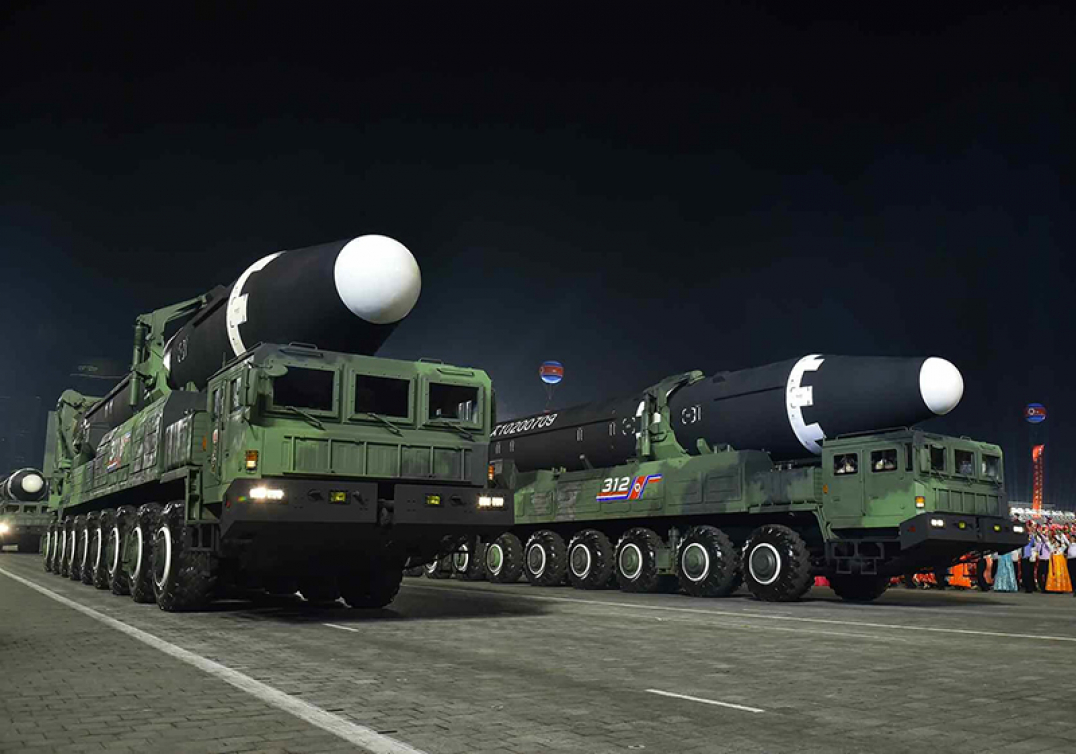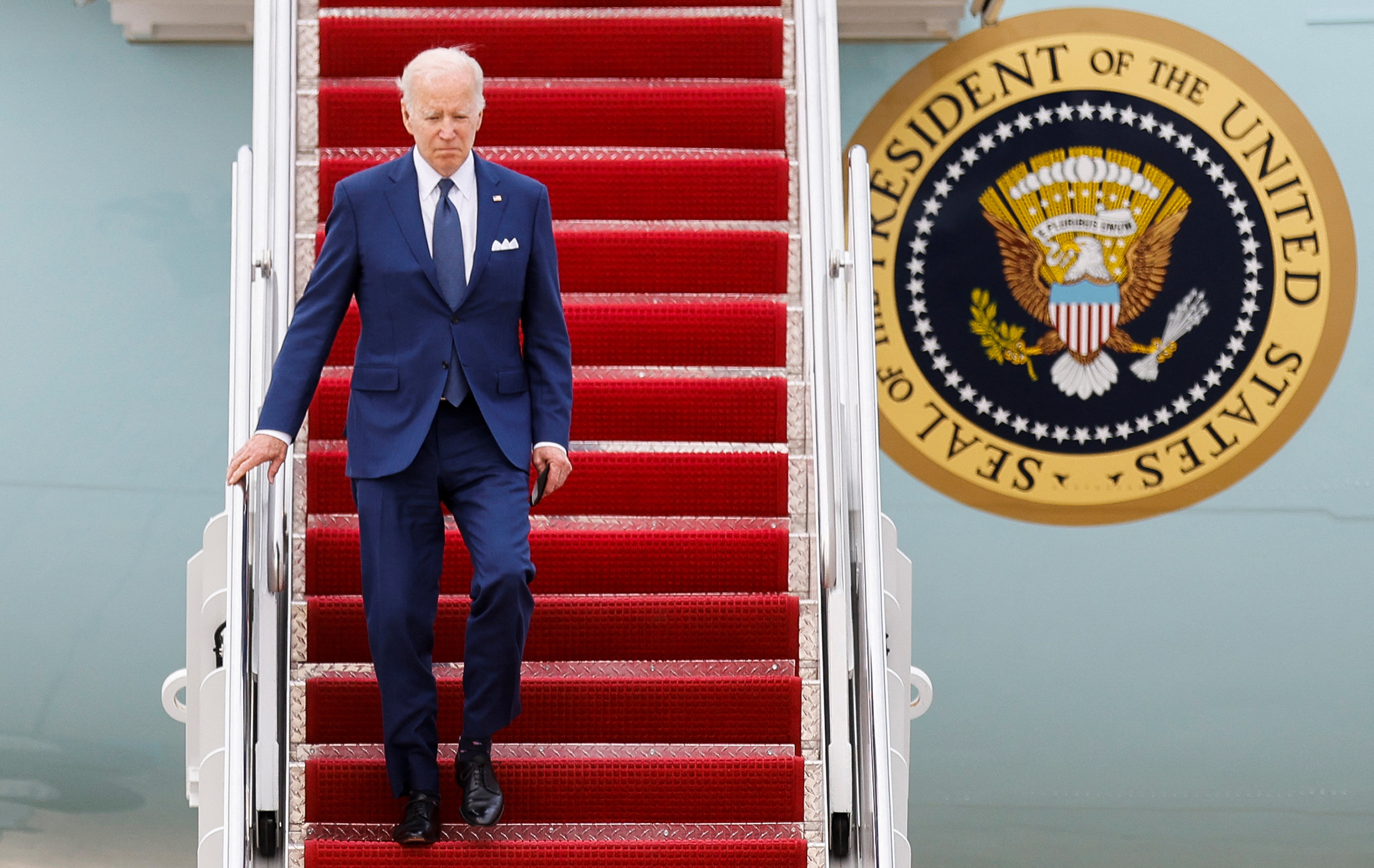North Korea fires three missiles after Biden ends Asia trip
By The Wall Street Journal May 26, 2022 (Gmt+09:00)
The missile was one of three fired by North Korea hours after┬ĀPresident Biden┬Āflew home from Asia following talks with the leaders of Japan and South Korea on deterring PyongyangŌĆÖs missile and nuclear threat.
U.S. government officials had warned that North Korea appeared ready to fire an ICBM around the time of┬ĀMr. BidenŌĆÖs trip to Asia. They also said Pyongyang was primed to hold its seventh test detonation of a nuclear bomb.
South KoreaŌĆÖs military said the North fired three missiles from the Sunan airfield near Pyongyang around 6 a.m. The suspected ICBM flew as high as 335 miles and traveled around 224 miles, the South Korean Joint Chiefs of Staff said.
A┬ĀNorth Korean ICBM launched in March┬Āreached 3,700 miles in altitude and traveled 680 miles.
South Korea said a second missile launched Wednesday exploded shortly after launch and a third short-range missile crashed into the sea. JapanŌĆÖs coast guard confirmed two apparent missiles landed in the sea between the Korean Peninsula and Japan.
Though North Korea didnŌĆÖt conduct weapons tests while Mr. Biden visited Seoul and Tokyo through Tuesday,┬ĀChina and Russia held a joint strategic-bomber exercise┬Ānear Japan on Mr. BidenŌĆÖs last day in Tokyo.
North Korea has conducted more than a dozen missile tests this year, including the┬Āfull-range ICBM launch┬Āin March and the launch of a┬Āballistic missile from a submarine┬Āearlier this month. The latest launches come as North Korea reports a nationwide outbreak of Covid-19 that leader┬ĀKim Jong Un┬Āhas called the nationŌĆÖs worst-ever crisis.
Weapons experts say that even when North Korean missile tests appear to fail or fall short of their goals, engineers gain knowledge that can advance the countryŌĆÖs weapons program. Launches of missiles that donŌĆÖt fly long distances can also be used to test components of larger weapons.
Missiles fired on Feb. 26 and March 4 with relatively short flight times tested components of a new ICBM system, U.S. officials said.
┬Ā

South Korea said it detected signs of the latest North Korean launches in advance and test-fired surface-to-surface missiles with the U.S. military in a move to show their readiness.
JapanŌĆÖs defense minister,┬ĀNobuo Kishi, said after WednesdayŌĆÖs launches that North KoreaŌĆÖs missile tests ŌĆØpose a threat to the peace and security of Japan, the region and the international community, and are absolutely unacceptable.ŌĆØ
U.S. Indo-Pacific Command in Hawaii said in a brief statement that the missiles didnŌĆÖt pose an immediate threat to U.S. personnel or territory, or to U.S. allies, but highlighted the destabilizing impact of the NorthŌĆÖs weapons program.
While in Seoul over the weekend, Mr. Biden agreed with new South Korea President┬Āto begin planning the resumption of┬Ājoint military field exercises with South Korea┬Āand pledged that the U.S. would be prepared to send nuclear-capable military assets such as bombers to Korea if Seoul faced a crisis with the North.
In Tokyo, Prime Minister┬ĀFumio Kishida┬Ātold Mr. Biden that Japan is committed to increasing military spending and developing capabilities to hit back at enemy missile bases that threaten Japan.
The U.S., South Korea and Japan have all sought talks with North Korea and say they would be willing to provide Pyongyang with aid to help it cope with the Covid outbreak. North Korea hasnŌĆÖt responded to any of the outreach.
Pyongyang has been gradually expanding its military arsenal since talks on denuclearization broke down in 2019 following an unsuccessful summit in Hanoi between Mr. Kim and then-U.S. President┬ĀDonald Trump.
Chieko Tsuneoka and Dasl Yoon contributed to this article.
Write to Alastair Gale at alastair.gale@wsj.com
┬Ā┬Ā
-

-
 EconomySouth Korea to boost aid for chipmakers to $23 billion, expanding extra budget
EconomySouth Korea to boost aid for chipmakers to $23 billion, expanding extra budgetApr 16, 2025 (Gmt+09:00)
-
 AutomobilesSouth Korea announces emergency support for auto sector against US tariffs
AutomobilesSouth Korea announces emergency support for auto sector against US tariffsApr 09, 2025 (Gmt+09:00)
-
 EconomyChina says it is aiming to coordinate tariff response with Japan, South Korea
EconomyChina says it is aiming to coordinate tariff response with Japan, South KoreaApr 02, 2025 (Gmt+09:00)
-





Comment 0